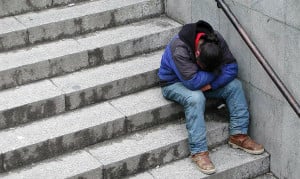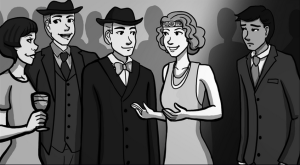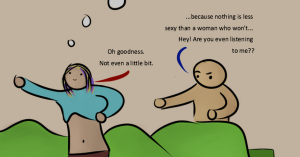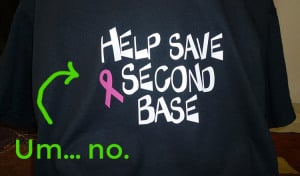Originally published on Mic and cross-posted here with their permission.
Expecting perfection from anyone, especially a young person in dire straits because they don’t have a place to call home, erases the issue at hand and engages in victim blaming rather than calling systemic forces into question.
Unless we face this issue head-on, we’ll never enact lasting change.
Here are some important facts about youth homelessness, to help the real conversation.
1. Many homeless youth exchange sex for food, clothing, shelter, and other basic needs.
Youth homelessness has increased 72% over the past seven years, according to reports from the National Center for Homeless Education.
With few other ways to earn a living, countless homeless adolescents use sex as a means of survival. In fact, the vast majority of them become sexually active at a young age and face more STI exposure than their non-homeless counterparts, per studies cited by the Department of Health and Human Services (DHHS).
In the process, many homeless youth lose out on developing and exploring their own sexualities in a free and open manner.
Predators use economic power to exploit homeless young people for sex, perpetuating a vicious cycle of abuse and dehumanization. Sex and drug trafficking snare many homeless youths, as do other potentially life-endangering street professions.
2. 40% of young people on the streets identify as LGBTQIA+.
Various reports estimate that, of any population, homelessness disproportionately affects queer and trans youth.
According to a 2012 study by the Williams Institute, nearly half of all homeless youth identify as LGBTQIA+, most of them young people of color.
Nearly 70% of homeless LGBTQIA+ youth face family rejection and/or abuse in the home, where the very people who should be protecting and encouraging them most are instead ostracizing them, even inflicting physical, emotional, or sexual abuse.
When homeless LGBTQIA+ young people do seek out vital support services, they often face the additional burden of being discriminated against or underserved if paired with social workers who lack the training or cultural competence to meet the community’s unique needs.
These needs include sexual health resources, or, for trans and gender non-conforming youth in particular, being treated with a baseline level of respect.
Thanks to inadequate data, it’s even tougher to craft policy and specific programming that best supports LGBTQIA+ homeless youth and homeless people at large. This impedes a more comprehensive assessment of the issue’s scale, according to a 2013 report by the Center for American Progress.
But no one can deny the magnitude of youth homelessness.
3. Most homeless youth won’t finish high school.
Three-quarters of homeless young people have either dropped out or will drop out of school.
The lack of educational attainment functions as yet another structural barrier to achieving independence through potential employment and, ultimately, a stable and safe living arrangement.
All students need the stability of a peaceful home environment where they can study and develop as young people critically engaged with their community and the world at large.
Without that, many homeless youth are left unable to transcend their circumstances, especially with scant resources and people available and willing to help them.
4. As many as 50% of homeless youth struggle with mental health or drug addiction issues.
Major depression is the most common mental illness, and it’s not uncommon for a homeless young person to cope with substance abuse at the same time, according to DHHS.
Those numbers are markedly higher when compared to housed youth, especially when factoring heavy alcohol use into the equation: 48% of homeless youth drink heavily versus 18% of their counterparts.
In Los Angeles, one study cited by DHHS reported that nearly half the region’s homeless youth have attempted suicide, with many making repeat attempts.
5. Government budgets and policies push youth homelessness further into the margins.
The epic 2012 sequestration battle in Washington, DC meant many social services programs lost important federal funding. That fight dealt homelessness programs a particularly heavy blow.
As reported by Washington Post, the Runaway and Homeless Youth Act is the only federal law that guarantees financial support for homeless young people, but the law’s funding was cut by 5% as Congress squabbled over the debt ceiling.
Many other state and local governments are following suit, with some relying more than others on federal funding to sustain vital services for homeless and runaway young people.
This year’s congressional budget discussions have not been much kinder, with advocates taking members of Congress to task for proposing further cuts to homeless services programs.
In an interview with ThinkProgress, Jerry Jones, executive director of the National Coalition for the Homeless, said that homeless services such as housing, health care and substance abuse programs “rely heavily on federal money because states and local jurisdictions, in many cases, don’t have as much money set aside in their budgets for that.”
Perhaps it’s time for Americans to remember young people the next time they write or call their elected officials — or when they step up to the ballot boxes in November for midterm elections.
As Bill Clinton said during the 2012 Democratic National Convention, “‘We’re all in this together’ is a far better philosophy than ‘You’re on your own.'”
With the limitless potential that many homeless young people have to make lasting, positive contributions to society, we cheat them and we cheat ourselves by not allocating our dollars, whether in taxes or whatever disposable income we can spare, to ensure that they too have a shot at attaining the so-called American Dream.
Organizations you can support to combat youth homelessness:
[do_widget id=”text-101″]
Derrick Clifton is a Staff Writer at Mic covering identity, culture and politics. A news commentator and reporter on issues of race, gender and sexuality, Derrick is also a master’s candidate at the Medill School of Journalism. Derrick identifies as a Black, queer, gender non-conforming, urban-raised person of faith with a disability. He’s also the author of the forthcoming book HEART WERK, a autobiographical series of essays about navigating life and love within multiple marginalized identities. Follow him on Twitter @DerrickClifton.
Search our 3000+ articles!
Read our articles about:
Our online racial justice training
Used by hundreds of universities, non-profits, and businesses.
Click to learn more




















